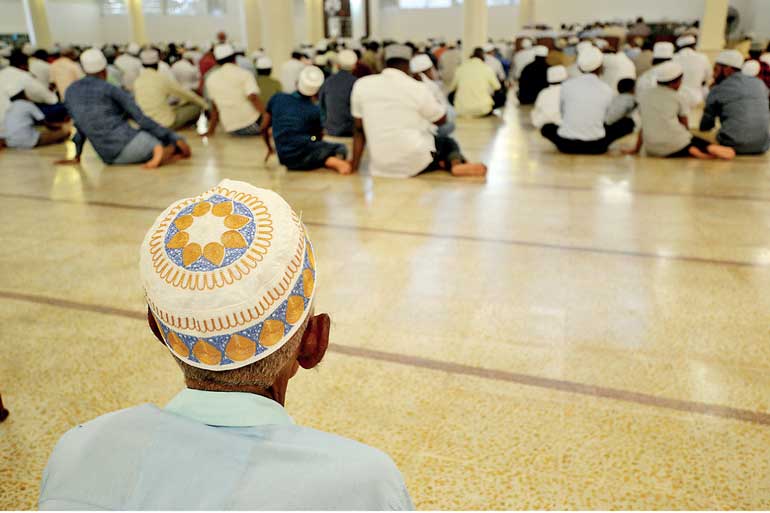Friday Feb 20, 2026
Friday Feb 20, 2026
Wednesday, 16 February 2022 00:00 - - {{hitsCtrl.values.hits}}

Stop the whimper and whine. Behave like a matured community to protect and maintain the dignity of the Muslims – Pic by Shehan Gunasekara
The All Ceylon Jamiyyathul Ulama (ACJU) was often seen in the news in the first decade of this century for its involvement in the halal certification process of food and other items for human consumption. The halal certified food market globally is estimated at $ 2 trillion. For the dollar-starved Sri Lankan economy the revenue through halal certified exports approximates to $ 1.6 billion according to the Halal Accreditation Council of Sri Lanka.
for its involvement in the halal certification process of food and other items for human consumption. The halal certified food market globally is estimated at $ 2 trillion. For the dollar-starved Sri Lankan economy the revenue through halal certified exports approximates to $ 1.6 billion according to the Halal Accreditation Council of Sri Lanka.
Despite these huge numbers and the globalised engagement relating to halal certification, some Sinhala Buddhist extremists were waging war against the halal certification process. Of course, they were ably supported and strengthened by monks of the same ilk, who had no idea of what this certification was and the great financial benefit that accrued to our country.
Allegations that the revenues from the halal certification was channelled to promote terrorist activities, that this certification was part of the strategy to make Sri Lanka a Muslim country and such wild, unsubstantiated and malicious propaganda became widespread. This created tension and suspicion amongst the already fragile multiracial, multiethnic and multireligious social fabric of our country.
Ulterior motive
These extremists were driven by opportunism and the cursed racist agenda which has brought this country to what we are today. Halal certification is a separate subject and was mentioned here to show how the relatively passive and almost unknown ACJU, to the general public, suddenly was in the limelight.
There were several others also who were opportunistic. These were from within a section of the Muslim community. Their concerns were more personal in nature, in some instances and, differences in the shade of religious opinions, in others. Thus, the ACJU found itself being confronted both from within the community and outside the Muslim community.
The All Ceylon Jamiyyathul Ulama (ACJU) is a very old Muslim religious institution established way back in 1924. In another two years, it would be completing 100 years of existence. Today, it is a body incorporated under Parliament Act No. 51 of 2000 and has a total of 8,000 subscribed members.
Engaging the Government and community
As an organisation, the ACJU displayed resilience in facing the multiple challenges and confidently charted its voyage through stormy seas. The Government was aware of the immense value of the halal certification; especially its potential as a foreign exchange earner. Our local export firms which export food and related products did not want to risk running out of business. Their products without the certification will be rejected by the foreign buyer. Therefore, it became necessary for the Government to intervene at a bureaucratic level to resolve the halal certification issue.
On the other hand, the community also engaged the ACJU at various fora to find common grounds for understanding and accommodation within the Muslim community. The halal issue found a quick resolution maybe because of the foreign exchange earnings at stake. Not so, was the community problem. It was a constant irritant like a festered old wound.
Vision and mission
Being the apex Muslim religious institution of the Sri Lankan Muslims, the ACJU has developed its own principled positions like any organisation. An interesting line seen in the website of ACJU regarding its vision is, “Towards a structured role model for the Muslim community living in accordance with Islamic values and teachings …” Further down was the mission statement with the following wordings, “To guide all sections of the Muslim community spiritually, morally and culturally based on Islamic teachings and to contribute to the educational, economic, social and cultural development of the community and nation, and to build social cohesion and inter-ethnic harmony.”
On 30 January 2022, an encouraging move was made by the ACJU at a public function held at the Ghafoor Hall in Zahira College, Colombo. It released a document outlining the ACJU’s Positions and Guidelines (Manhaj) for Sri Lankan Muslims in Religious Affairs. Notably, Members of the Fatwa Committee and many senior scholars of the country were present at the event.
Community-friendly positioning
In explaining the purpose of this Manhaj, it is stated, “Throughout history, Sri Lankan Muslims have acted in solidarity with each other and co-existed with other communities under the guidance of the Aalim (the learned) in matters of religion. It also aims, “to create a model, structured community that can maintain social cohesion, approach religious affairs calmly and objectively under the guidance of alumni, respect alternative views, coexist with alternative religions, and contribute to the nation with patriotism.”
As for the content of the Manhaj document, it says, “This guide deals with matters relating to the tenets of the Muslims; It contains detailed guidelines on the position of the Prophet (peace and blessings of Allah be upon him) and his family and companions, as well as on the matters of the believers, the madhhabs, the relationship with tasawwuf (spiritual purity), other heresies, and the rules to be followed when presenting Islamic teachings.” (The complete document can be seen in the ACJU website).
The whimper and whine
The Muslims are a vibrant community, living in this country for more than a thousand years. They have contributed immensely to the affairs of this country economically and in every aspect of life from the times of the ancient kings. The Muslims undeniably have been patriotic citizens of this country. Their sacrifices while serving in the military and in the Police are beyond reproach. As a community, just like the others, they live with dignity and self-respect.
Every community has its own set of issues and problems and they choose to resolve it amongst themselves. Have we seen a Sinhala or Tamil person or organisation seeking assistance from a Muslim organisation to solve their religious misunderstandings? In this context, it is undesirable for the Muslims to look outside of their circle for solutions to problems within themselves. Worst is the situation when the matter relates to Islamic jurisprudence. Learned and experienced Muslim scholars consider themselves only as students of this vast subject of Islamic jurisprudence. How then can a complete stranger be able to decipher the nuances and intricacies of the depth of Islamic knowledge, its philosophy, eschatology,
Islamic ontology and epistemology?
Now that the ACJU has publicly declared the Manhaj which is inclusive and broad in its perspectives, it will be prudent for all the Muslims to shed their differences or, seek to resolve any disagreements from within. Stop the whimper and whine. Behave like a matured community to protect and maintain the dignity of the Muslims.
(The writer can be reached via email: [email protected].)